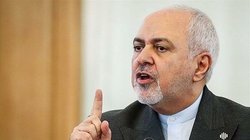 Iranian Foreign Minister Mohammad Javad Zarif said Saudi Arabia was one of the three state sponsors of terrorism in the world which backed the decision to blacklist Tehran by the Financial Action Task Force (FATF).
Iranian Foreign Minister Mohammad Javad Zarif said Saudi Arabia was one of the three state sponsors of terrorism in the world which backed the decision to blacklist Tehran by the Financial Action Task Force (FATF). RNA - After casting votes for the 11th parliamentary election in Iran and the election for the Assembly of Experts, Zarif told the media that the two countries as well as “a pro-terrorist regime” are opposing the extension of Iran’s time.
He elaborated on the three supporters of blacklisting Iran, tacitly referring to the US as a country which “is itself terrorism” as it has shown its state terrorism with the assassination of Iranian Lieutenant General Qassem Soleimani and has demonstrated its economic terrorism with the imposition of sanctions on Iran and other countries.
Saudi Arabia is a real model of terrorism, the Iranian minister said, referring to the Zionist regime as a regime, state terrorism has been basically named in its name.
Last Sunday, Governor of the Central Bank of Iran (CBI) Abdolnasser Hemmati said that the decision to be taken by the FATF on Iran's case in its February assembly meeting will not leave a meaningful impact on the country's foreign currency market.
"Under the present circumstances that most foreign banks do not show necessary cooperation with Iran due to the US heightened sanctions and our foreign currency exchanges are carried out through alternative mechanisms which cannot be sanctioned, the future decision by the FATF cannot leave considerable impact on Iran's foreign currency conditions," Hemmati wrote on his Instagram page on last Sunday.
He, meantime, stressed that the CBI will continue powerful monitoring of monetary flow and transactions and fight against money-laundering alongside management of the foreign currency market.
The FATF in October extended suspension of its measures against Iran, giving the country four more months until February 2020 to comply with requested recommendations.
“If before February 2020, Iran does not enact the Palermo and Terrorist Financing Conventions in line with the FATF Standards, then the FATF will fully lift the suspension of counter-measures and call on its members and urge all jurisdictions to apply effective counter-measures, in line with recommendation 19,” the FATF said in a statement.
Iran has been required to fulfill dozens of FATF recommendations to enhance its status from a blacklist of non-cooperative countries, while the country is under US sanctions. The country's status in FATF has no impact on toughening or easing the US sanctions.
FATF has required Iran to implement a number of moves that include endorsement of several conventions.
Palermo bill is one of the four government bills seeking to bring Iran's anti-money laundering and countering terrorism financing standards into line with those defined by the FATF.
The parliament has approved all the measures but except for the bill that updates Iran's domestic law on countering financing of terrorism. All the rest have been rejected by the Guardian Council – a watchdog that ensures laws are in line with the Constitution and Sharia.
The bills on Iran’s accession to the Palermo Convention and the convention against the funding of terrorism (CFT) were rejected by the Guardian Council in early November due to some flaws that violated the country’s Constitution. The bills were then amended by the Iranian Parliament, waiting for the next steps in the Guardian Council.
According to Fars News Agency, to fulfill FATF requirements, President Hassan Rouhani’s administration has proposed four bills to the parliament for approval, two of which are still undecided, including the Palermo Convention. They have been referred to the Expediency Council for final approval.
Yet, Iran has recently approved a national anti-money laundering (AML), which was a domestically-developed bill.
In its October meeting, the FATF decided to extend the deadline for Iran until February to complete reforms under the specified action plan that includes a list of 9 major moves, including the opening of its financial transactions data bank to the FATF that is headed by the US Department of the Treasury’s Assistant Secretary heading the Office of Terrorist Financing and Financial Crimes Marshall Billingslea.
The Political-Defense-Security and Legal-Judicial Commissions of the EC declared last January that endorsement of the Palermo bill would run against the country's interests.
847/940